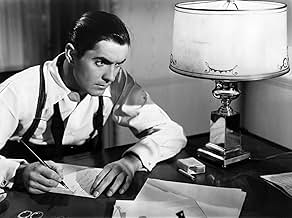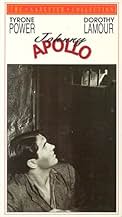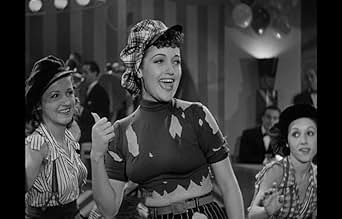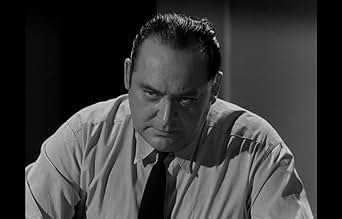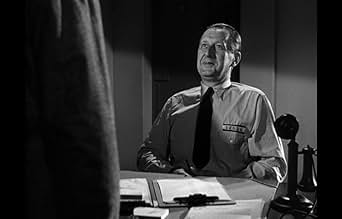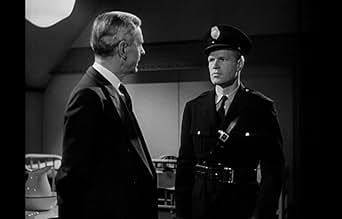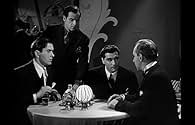Bob est devenu Johnny Appolo, un truand. Sa déviance dans le crime est lié au fait que son père a été arrêté. Lui-même arrêté, il retrouve son père sous les habits d'un gardien de prison.Bob est devenu Johnny Appolo, un truand. Sa déviance dans le crime est lié au fait que son père a été arrêté. Lui-même arrêté, il retrouve son père sous les habits d'un gardien de prison.Bob est devenu Johnny Appolo, un truand. Sa déviance dans le crime est lié au fait que son père a été arrêté. Lui-même arrêté, il retrouve son père sous les habits d'un gardien de prison.
- Réalisation
- Scénario
- Casting principal
- Récompenses
- 2 victoires au total
- Warden
- (as Selmar Jackson)
- Announcer
- (voix)
Avis à la une
After Power's initial snit over Dad's letting him down, his attempts to secure him an early parole lead, though `connected' shantoozie Dorothy Lamour, to the underworld. The muscles he developed rowing crew in the Ivy League stand him in good stead as muscle in the mob, for soon he becomes a trusted lieutenant in Lloyd Nolan's crime family (plausibility is not the movie's long suit). But Pop (who has reclaimed his spiritual center in the Big House by welding boilers) disowns his namesake when he learns of his new line of work. In due time, of course, Power ends up behind those bars as well. But that's far from the end of the tale....
The plot of Johnny Apollo, a major production, takes a few turns too many but manages to keep a just-passable amount of credibility. Though Power, in the lead, stays less than persuasive as a menacing mobster he's too much of a pretty-boy, and lacks the acting resources to turn himself into a pretty-boy psychopath the rest of the cast compensates. Predictably, Arnold is good, as is, in the role of a mob mouthpiece with a weakness for Scotch-and-milk, Charlie Grapewin (whose first film credit falls in the last year of the 19th Century!); the two seem to be vying for title of America's sweetheart, old-codger division. Best of all is Lamour, with her sad eyes and fetching pout, who leaves an impression here of a skilled actress, more than she managed in all the Hope-Crosby `Road' pictures put together.
Direction is by Henry Hathaway, an uneven craftsman who nonetheless rose to the occasion for a handful of movies; this can be counted among his stronger efforts, along with The Dark Corner, Kiss of Death, Fourteen Hours and Niagara. But Johnny Apollo cleaves more closely to the crime melodramas of the previous decade than to the unsentimental and ambiguous style soon to come. But, in it, one can nonetheless sense particularly in its heavily shaded photography the birth pangs of film noir, struggling to come into the world.
The film begins with Edward Arnold being arrested for stock fraud. Suddenly, his millions are gone and his son (Tyrone Power) must leave school and fend for himself. In a very odd scene between the two before Arnold is sent to prison, Tyrone expresses disappointment in his father and Arnold responds by disowning him! Considering everything that Arnold had done, his sanctimonious response was perplexing. Despite being disowned, Power did still care about his father. However, he was also shocked to see that Dad's reputation ruined his chance to get a job--as everyone held this against him. Then, after changing his name, his only employer fired him because he DIDN'T acknowledge Arnold as his father! Sometimes you just can't win.
Now, without a job AND wanting to earn enough money to hire a shyster lawyer to file an appeal (as responsible ones won't), Tyrone approaches a drunken lawyer who has a history of playing fast and loose with the truth. In the process, he comes to know a notorious hood (Lloyd Nolan) and is soon hired--and he's now on the fast track to be able to afford the lawyer and to "grease the right palms" to get Arnold sprung from jail. Oddly, however, they never really show or talk about Power doing anything especially illegal!
Soon after beginning work with Nolan, Power has a reconciliation with Dad when he visits the prison. However, when Arnold learns that his son is working for the underworld, he vows, once again, to have nothing to do with Power. Again, this makes little sense. The first time, he disowns him for not being for accepting of his evil ways and now that Power, too, is a crook the father can't accept him once again! There's a lot more to the plot than this and Power even eventually is imprisoned in the same place as his dad!
Along for the ride is Dorothy Lamour as a lounge singer with a heart of gold and Charlie Grapewin (in one of his best roles) as the crooked attorney. All in all the acting (especially Nolan and Arnold) is very good and the film has so many plot elements and twists that it is a decent example of early Film Noir. Entertaining and impossibly improbable--plus it really is a bit hard to believe Power as a mobster.
This story is too loosely plotted, but not in a way that makes it difficult to follow...
Helping immensely is that the film is great looking, and directed exceptionally by Henry Hathaway. The black-and-white cinematography is especially noteworthy; photographer Arthur Miller might have received his annual "Academy Award" nomination for this one, if the studio wasn't backing him in "The Blue Bird" (1940). Then Fox' biggest star, Power shows he might have accomplished the same feat at MGM or Warner Bros. Singing and "Dancing for Nickels and Dimes", Ms. Lamour is luscious, especially in a leggy skirt and clinging top. Dependable supporting actors like Mr. Nolan and Mr. Grapewin get juicy parts, too.
******* Johnny Apollo (3/15/40) Henry Hathaway ~ Tyrone Power, Dorothy Lamour, Lloyd Nolan, Edward Arnold
Enjoyable gangster drama with a fine cast. Some have said Power is miscast. I think he's okay for the part. It's not really a gritty movie, despite the plot. Maybe if it had been a tough film noir, I could see the point that Power was wrong for the role. But it's not and he isn't. Edward Arnold is good. I doubt the man ever did a bad acting job in his career. His character is somewhat poorly written and hard to relate to, but it's difficult to dislike him due to Arnold's sympathetic performance. Nice to see Charley Grapewin playing something besides a grizzled old-timer without most of his marbles. Beautiful Dorothy Lamour is always a plus and it's good to see her in a serious role. Lloyd Nolan pretty much steals the movie as the gangster Mickey Dwyer. Lionel Atwill is largely wasted as Arnold's attorney.
The biggest flaw with the movie is that its plot isn't always consistent. Arnold's character is a crook who first treats his son like crap for not being okay with his crookedness. Then later he treats his son like crap for becoming a criminal like Dad. Still, it's an enjoyable movie. The script's got some nice dialogue. Watch for the scene where Power chases, tackles, and beats Marc Lawrence's head against the ground! Yikes!
Le saviez-vous
- AnecdotesIn the scene with Johnny and his father talking in the bedroom, the photo over Johnny's shoulder of his mother, is a picture of Tyrone Power's mother.
- GaffesWhen Mickey comes into the judge's offices after the judge has smashed the two whisky bottles, he comments that the room smells like a brewery. It is more likely that the room would smell like a distillery rather than a brewery and Mickey would be aware of the difference.
- Citations
Prisoner Tom Dugan: I steal an empty slot machine and get 10 years, and this guy steals a million and gets 5. Figure that out, will yuh?
Main Reporter: [Sarcastically] That's why you got the 10 - to figure it out.
- ConnexionsFeatured in Les enquêtes de Remington Steele: Cast in Steele (1984)
- Bandes originalesThis Is the Beginning of the End
(1940)
Written by Mack Gordon
Performed by Dorothy Lamour (uncredited) with Harry Rosenthal (uncredited) at piano
Played as background music often
Meilleurs choix
- How long is Johnny Apollo?Alimenté par Alexa
Détails
- Date de sortie
- Pays d’origine
- Langue
- Aussi connu sous le nom de
- Dance with the Devil
- Lieux de tournage
- Sing Sing Penitentiary - 354 Hunter Street, Ossining, New York, États-Unis(exteriors: prison)
- Société de production
- Voir plus de crédits d'entreprise sur IMDbPro
- Durée
- 1h 34min(94 min)
- Couleur
- Rapport de forme
- 1.37 : 1

